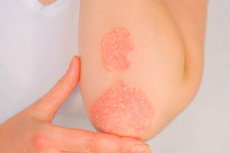Low stress tolerance is associated with an increased risk of developing psoriasis
最近審查:14.06.2024

Young people who have more difficulty coping with stress are more likely to develop psoriasis later in life. Low stress tolerance during military service was associated with a 31% higher risk of developing psoriasis compared with high stress tolerance. This is shown in a large study based on the registers of the University of Gothenburg.
The study, published in the Journal of the European Academy of Dermatology and Venereology, is based on data from more than 1.6 million Swedish men who enlisted in the military since 1968 to 2005.
As part of the enrollment process, all men underwent psychological assessments using the same strict template. Based on this assessment, the researchers divided the data on men's resilience to stress into three levels. A fifth (20.4%) of those enrolled were classified in the lowest group, and another fifth (21.5%) were classified in the highest group. More than half were classified as intermediate.
The data on the men was then compared with other registers. The National Patient Registry was used to obtain diagnosis codes for psoriasis and psoriatic arthritis.
About 36,000 men later developed psoriasis or psoriatic arthritis. Low stress tolerance in men is associated with a 31% higher risk of developing psoriasis compared to high stress tolerance.
More severe cases of psoriasis and psoriatic arthritis were also particularly strongly linked to stress. For hospitalization diagnoses, low stress tolerance was associated with a 79% higher risk of psoriasis and a 53% higher risk of psoriatic arthritis compared with high stress tolerance.
Psychological sensitivity
This is the first study to support the hypothesis that stress sensitivity is a risk factor for psoriasis. Since psoriasis is a chronic inflammatory systemic disease, the association with stress may be due to an increased inflammatory response in the body.
“We showed that low stress tolerance in adolescence is a potential risk factor for psoriasis, at least for men,” says lead study author Marta Laskowski, a doctoral student in dermatology at the University of Gothenburg and a resident at Sahlgrenska University Hospital.
"Our results indicate that people with psoriasis have an inherited psychological sensitivity. Therefore, it is important that health care providers also pay attention to the mental well-being of patients with psoriasis."
The researchers took into account other risk factors, such as body mass index (BMI) and socioeconomic factors, when assessing the increased risk. However, the study could only account for smoking indirectly, which is a well-known risk factor for psoriasis. The researchers note that one weakness of the study is that stress tolerance was tested only once, at the time of enrollment, when the men were 18 years old.
“Resilience to stress can vary throughout life,” adds Martha. "However, we did not have the opportunity to study these changes."

